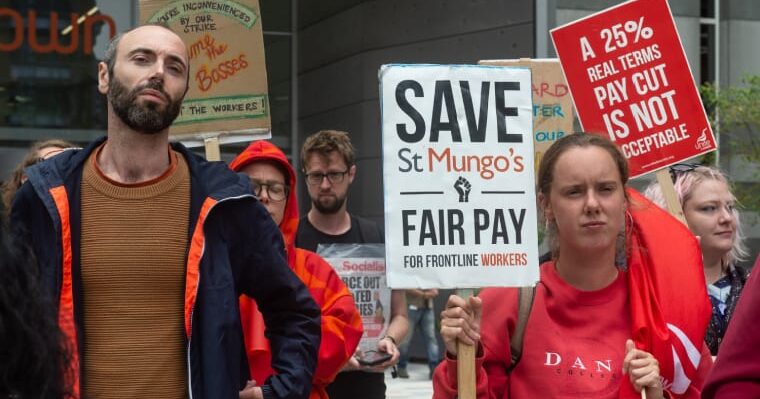

By Jeremy Dewar
Over 800 workers at the homeless charity St Mungo’s have voted to end their three-month all out strike. Set to return to work on 4 September, they can hold their heads high, having secured a significant pay rise and acted as a beacon for other workers to follow.
The bosses initially offered just 2.25%. Their increase to 3.7% was roundly rejected, but when they raised this to 4.2% and added a £700 one-off payment and confirmed they would add in the local authority pay award of £1,925 for both last year and this, it swung the vote. Even then 42% of the strikers – and the vast majority of activists—voted to reject the deal. Unite officials claim this was a victory, averaging 10.74% for workers. But many strikers feel cheated as they were aiming for far more after a 25% fall in real pay over the preceding decade and the still rising cost of living. Nevertheless the compromise is completely down to their resilient struggle.
The achievements of the strike, which started on 30 May, are legion: over 300 new union members; a successful battle against the use of agency scabs (finally won in the courts on 10 August); lively pickets, fundraisers and demos outside St Mungo’s HQ, scab-herding employment agencies and the charity directors’ other business concerns. They also successfully fought off Unite’s attempts to suspend the indefinite strike for three weeks in July.
But their biggest achievement was the formation of rank and file elected strike committees and their combination into a London-wide strike leadership. This held the potential of developing into an alternative strike leadership to that of general secretary Sharon Graham and the Unite bureaucracy. However, that potential was not fulfilled.
While the committees proved invaluable in forcing Unite to continue the strike, rallying members to reject two previous offers and keeping the momentum up for three months, they failed to impose their will over the bureaucracy and take control of the strike.
Although SWP members are to be commended for initiating the strike committees and for raising the profile of and funds for the strikers, the group failed to prepare the strike leaders for a showdown with the bureaucracy, even when it was clear a rotten compromise was in the offing.
The strikers could have done this by demanding the immediate ousting of those reps, and the convenor, who consistently backed bad deals, parroted the charity’s propaganda and, in at least two cases, even scabbed on the strike. They could have demanded an end to the constant balloting (three times in six weeks) and encouraged the spreading of the strike to other charities. Indeed, they should have prepared for such actions, once it became clear that Unite was winding down the dispute.
Once the rank and file starts to organise, elect its own leaders and fight to win, it is only a matter of time before it has to battle against the bureaucratic caste that sits on top of Unite and all the other unions. The preparation for that cannot be left to chance. Socialists must provide the necessary leadership in this inevitable struggle.
This now must become the task of the St Mungo’s militants. Keep the strike committees going, prepare for new battles and oust the rotten time-serving reps who bottled it and replace them with accountable class fighters.
This work must include at its heart a political campaign to abolish homelessness altogether with millions of new council homes, built and run under workers’ control and paid for by taxing the bosses. Such a campaign would build on the already widespread support the strikers have won for their cause and prepare for a sector–wide strike.